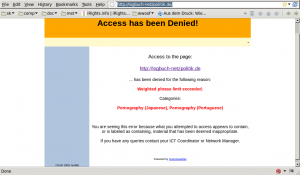We recently received a complaint from a German tourist saying that when he tried to access a couple of innocuous German political sites using the free wireless at Te Papa, a page was displayed saying that his access to those sites was blocked. Te Papa had implemented internet filtering software to control what websites people could access.
The tourist complained to Te Papa. They initially tried to fob him off, but eventually he got through to someone and those sites were removed from the filter. A good outcome, right?
Not So Simple
This incident raises a number of questions:
- Why is Te Papa filtering what people see on the internet?
- What type of content is being blocked?
- Who chooses which types of content to block?
- Finally, why are they using software that flags a German political website as “Pornography (Japanese)”?

Why censor internet access?
We spoke to Te Papa but they couldn’t tell us why they felt the need to censor their wireless. They did know that they blocked file sharing protocols to reduce internet traffic but couldn’t tell us why they were blocking some websites. We’d understand if Te Papa wanted to use some censorware on internet terminals available to children, but their filter goes far beyond that.
Are they worried that people will somehow download banned material? It’s not their responsibility and it’s not like they’re monitoring phone calls to make sure people don’t have illegal conversations.
Are they worried that people will browse offensive material (pictures/video) in a public place and annoy others? An increasing number of their guests have smartphones and “bring their own internet” and someone could as easily watch a porn DVD on a portable player. In any of these cases, it would be a simple matter of asking them to stop.
We reject the idea that internet providers (for that is what Te Papa is doing by providing free wireless) are in any way responsible for what an internet user does with that connection, in the same way that they aren’t responsible if someone uses Te Papa provided water or electricity.
Te Papa’s Filter
Te Papa could tell us that they are using internet filtering supplied by their internet service provider, Telstra Clear, but they had very little idea about how it works.
- They don’t know why they’re blocking some types of content.
- They don’t know what type of content is being blocked.
- They don’t know who decides what to block and what criteria they use.
- They don’t really want to find out, saying that they’re “happy for them [Telstra Clear] to make the decisions”.
Any museum and art gallery is surely aware of issues around censorship and free speech, Te Papa itself has been involved in certain controversies about what should be shown and to who. Why has Te Papa chosen to censor the internet with so little thought about why and how? As our visiting tourist put it:
Seeing this happen at Te Papa, a flagship of the capital, tells me something about democracy and the importance of free speech and human rights in NZ.
Our view
We tend to side with the visiting German tourist – it’s inappropriate for a place like Te Papa to be censoring the internet.
We suggest that worries about people accessing “bad material” over public internet are overstated. Any inappropriate behaviour (e.g. viewing internet pornography in a public place) can be solved by asking them to stop.
If an organisation decides to press on with censorship anyway, it would seem at a minimum that they should:
- Be able to tell people what sort of material is blocked and why they’re doing it.
- Have a process for deciding what to block.
- Provide an easy way to appeal any incorrect blocking.
- Not use software that is as badly written as that used by Te Papa and TelstraClear.
Of course, once you look at all that, doesn’t it just seem easier to let people have unconstrained internet access in the first place?